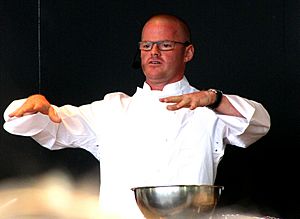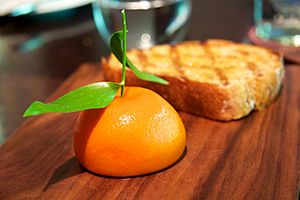Heston Blumenthal facts for kids

Blumenthal in 2010
|
|
| Born | Heston Marc Blumenthal 27 May 1966 Shepherd's Bush, London, England |
|---|---|
| Cooking style | |
| Education | John Hampden Grammar School Latymer Upper School |
|
Rating(s)
|
|
|
Current restaurant(s)
The Fat Duck
Dinner by Heston Blumenthal Dinner by Heston Blumenthal (Dubai) The Hinds Head The Perfectionists' Cafe |
|
|
Previous restaurant(s)
The Crown at Bray
|
|
|
Television show(s)
Heston's Great British Food
Kitchen Chemistry In Search of Perfection Crazy Delicious Big Chef Takes on Little Chef Heston's Feasts How To Cook Like Heston Heston's Fantastical Food Heston's Mission Impossible Inside Heston's World |
|
Heston Marc Blumenthal is a famous English chef, TV star, and food writer. He was born on May 27, 1966. His restaurant, the Fat Duck in Bray, Berkshire, has three Michelin stars. In 2005, it was even named the world's best restaurant!
Heston Blumenthal is known for his unique cooking style. He explores how all our senses affect how we taste food. He became famous for unusual recipes like bacon-and-egg ice cream and snail porridge. His recipes for triple-cooked chips and soft-centred Scotch eggs are now very popular. He believes in using science in cooking. Because of this, he has received special awards from universities and the Royal Society of Chemistry.
You might have seen Heston on TV shows, especially on Channel 4. He also created a line of food products for the Waitrose supermarket. Besides The Fat Duck, he owns Dinner, a two-Michelin-star restaurant in London. He also has a one-Michelin-star pub in Bray called the Hind's Head.
Heston Blumenthal has attention deficit hyperactivity disorder (ADHD), which he thinks helped him focus on his work. He also has bipolar disorder and is an ambassador for the charity Bipolar UK.
Contents
Early Life and Cooking Dreams
Heston Marc Blumenthal was born in Shepherd's Bush, London, on May 27, 1966. His father was a businessman, and his mother was a secretary. His last name, Blumenthal, means "flowered valley" in German. He grew up in Paddington and went to several schools, including Latymer Upper School.
His love for cooking started when he was 16. On a family holiday in France, he visited a fancy three-Michelin-star restaurant. He was amazed by the food and the whole experience. The sounds of fountains, the smell of lavender, and seeing waiters carve lamb inspired him. He learned to cook by himself, often using French cookbooks.
After school, Heston tried an apprenticeship at a famous restaurant but left quickly. For the next ten years, he worked in regular jobs during the day. But every evening, he taught himself French cooking. A book called On Food and Cooking: the Science and Lore of the Kitchen changed his view on cooking. It made him question old cooking rules and encouraged him to think scientifically about food.
Heston's Culinary Journey
In 1995, Heston Blumenthal bought an old pub in Bray, Berkshire. He turned it into the Fat Duck. At first, it was just him and a dishwasher. They served French-style dishes. Even then, science influenced his cooking. For example, his famous triple-cooked chips were developed to keep potatoes from getting soft. The restaurant almost failed, and Heston had to sell his house and car to keep it open.
Achieving Michelin Stars
The Fat Duck earned its first Michelin star in 1999. In 2001, it received a second star and was named restaurant of the year. Heston opened another restaurant in Bray in 2002, but it didn't last long.
In 2004, The Fat Duck earned its third Michelin star. This made it one of only three restaurants in the UK with this top honor. At that time, Heston said he was still very close to going bankrupt. Also in 2004, he bought the Hind's Head pub in Bray. This 15th-century pub now serves traditional British dishes. In 2011, it was named the Michelin Pub Guide's Pub of the Year.
Expanding His Restaurant Empire
In January 2011, Heston opened his first restaurant outside Bray, called Dinner. It's located in the Mandarin Oriental Hyde Park, London. Historians helped him create dishes based on old British recipes. Dinner earned its first Michelin star in 2012 and a second in 2014. In 2013, it was voted the seventh-best restaurant in the world.
In June 2014, Heston announced a new restaurant, The Perfectionists' Cafe, at Heathrow Airport. In 2015, The Fat Duck moved temporarily to Melbourne, Australia, while its Bray location was being renovated. After its temporary run, the Melbourne restaurant became a permanent branch of Dinner, though Heston no longer owned it.
Heston on Television
Heston Blumenthal has starred in many TV shows. In 2002, he made Kitchen Chemistry with Heston Blumenthal for Discovery Science. From 2004 to 2007, he hosted Heston Blumenthal: In Search of Perfection on BBC.
In 2008, Heston moved to Channel 4. In 2009, he tried to improve the Little Chef roadside restaurant chain in a three-part TV series. Little Chef used his new menu in 12 locations, but later removed them.
Heston also presented Heston's Feasts, where he created themed dinner parties. This show had a second series in 2010. In 2011, Heston's Mission Impossible aired, showing him trying to improve food in different industries. In 2012, How To Cook Like Heston taught home cooks some of his easier techniques.
In November 2012, he presented Heston's Fantastical Food. In 2014, he hosted Heston's Great British Food. More recently, in 2020, Heston was a judge on the Channel 4 show Crazy Delicious. In 2021, he was a guest judge on the French version of Top Chef. In July 2022, he was a guest judge on the final episode of the Australian Masterchef.
Partnership with Waitrose
In 2010, Heston teamed up with the supermarket chain Waitrose to create special food products. His early products weren't very successful. However, his Christmas pudding with an orange inside, released in 2010, sold out very quickly. People even sold them on eBay for high prices! Other products included a bloody Mary prawn cocktail and puff pastry mince pies. This partnership inspired other supermarkets to create unusual products too. In 2023, Waitrose ended its contract with Heston.
Heston's Cooking Methods
Heston Blumenthal is famous for his scientific approach to cooking. He explores "foodpairing," which means combining ingredients that have similar molecules. One example was his white chocolate with caviar. He also created unusual combinations like salmon in liquorice gel with asparagus. While these combinations are often praised, Heston believes that a chef's intuition is still very important.
The "New Cookery" Approach
Since the late 1990s, Heston has been a leader in "molecular gastronomy." This style uses science, precision, and technology in cooking. In 2006, Heston and food scientist Harold McGee wrote a "Statement on the 'New Cookery'." They explained that new techniques and ingredients should only be used if they make a dish better. For example, liquid nitrogen shouldn't be used just for fun. They also believe that working with scientists can help cooking improve.
Multi-Sensory Cooking
Heston calls his scientific cooking style "multi-sensory cooking." He believes that eating uses all our senses at once. His trip to the French restaurant at age 16 showed him how sounds, smells, and sights can make food more enjoyable. He realized that his restaurant, The Fat Duck, didn't have grand views, so he had to capture diners' imaginations in other ways.
A key moment was when he made crab ice cream for a crab risotto. People didn't like "crab ice cream," but if he called it "frozen crab bisque," they found it more acceptable. This showed him how much a name can change how we taste food.
Heston has done experiments to show how sounds affect taste. In one experiment, people ate oysters while listening to either sea sounds or farm sounds. They found the oysters tasted better with sea sounds. Another experiment showed that the sound of sizzling bacon made bacon-and-egg ice cream taste more like bacon.
These experiments show that how we enjoy food is personal. It depends on what our senses tell our brain and our memories. Heston designs his dishes to appeal to all senses and bring back memories. For example, his Nitro-poached Green Tea and Lime Mousse is served with a lime grove scent. His Jelly of Quail dish comes with oak moss and a special oak moss scent.
His most famous multi-sensory dish is "Sound of the Sea." It looks like a seashore with edible sand and sea foam. It's served on a glass box with real sand. Diners wear headphones and listen to seagull sounds and ocean waves. Heston wanted to transport diners to another place through all their senses.
Famous Dishes

Some of Heston's most famous dishes include triple-cooked chips, snail porridge, bacon-and-egg ice cream, and Meat Fruit. Meat Fruit is a chicken liver mousse made to look exactly like a mandarin orange.
He was one of the first chefs to use sound as part of the dining experience. His Sound of the Sea dish is a great example. He also uses scented dry ice in his cooking. Heston and The Fat Duck are known for starting the trend of bacon desserts.
Historical Cooking Influences
Heston Blumenthal often uses British history in his dishes. He became interested in old recipes in the late 1990s. He found a book from the 15th century with unusual recipes, like a chicken that seemed roasted but would wake up when served! He realized that cooking from the past could be very fun and creative.
He met food historians and started creating dishes inspired by old British cookbooks. The first historical dish he perfected was Quaking Pudding, which is now on the menu at the Hinds Head. His restaurant Dinner by Heston Blumenthal focuses entirely on dishes inspired by historical recipes. His 2013 book Historic Heston shares many of these historical recipes.
Cooking for Royalty
In 2009, Heston was invited to cook for Queen Elizabeth II at Windsor Castle for a private party. The menu included baked salmon and strawberry gateau. He was also chosen to prepare the picnic meal for the Queen's Diamond Jubilee celebrations in June 2012. He was even a guest in the Royal Box at the Queen's Diamond Jubilee concert.
Awards and Recognition
Heston Blumenthal has received many awards for his cooking and his scientific approach.
Personal Awards
In 2004, he won the Chef Award at the Catey Awards. In January 2006, he was made an OBE for his contributions to British food.
He has received honorary degrees from several universities, including Reading, Bristol, and London. These awards recognize his unique scientific approach to food. In July 2006, he was the first chef to be given an Honorary Fellowship by the Royal Society of Chemistry. In June 2013, he was granted his own coat of arms, which includes the motto "Question Everything."
Chef's Awards
- Best Restaurant of the Year Award – Decanter, 1998
- Chef of the Year – Good Food Guide, 2001
- AA Guide chef's chef of the year Award – AA Guide Publications 2002
- Catey Awards Restaurateur of the year Award – Caterer & Hotelkeeper, 2003
- Food & Wine Personality of the Year Award – GQ Glenfiddich Awards 2004
- GQ Magazine Chef of the Year – GQ Magazine Man of the Year awards 2004
- GQ Personality of the year – GQ Glenfiddich Awards 2007
- Chef's choice award – San Pellegrino Worlds 50 Best Restaurant Awards April 2007
- Trophy Gourmand – Austria 2010
- GQ Chef of the Year – GQ Man of the Year Awards 2010/2011
- The Diners Club® Lifetime Achievement Award 2017 at The World's 50 Best Restaurants 2017.
Television and Book Awards
- Best Cookbook for "Family Food: A New Approach to Cooking" – Gourmand World Cookbook Awards 2003
- Best Children Cookbook for "Family Food: A New Approach to Cooking" – Gourmand World Cookbook Awards 2004
- Best Production "Heston Blumenthal – In Search of Perfection" BBC2 – GQ Glenfiddich Awards 2007
- The Guild of Food Writers Awards 2014 – Historic Heston book, Heston and his ghost writer, Pascal Cariss won the prestigious award for on British Food.
- BAFTA nomination in the Features category for "Heston Blumenthal: In Search of Perfection"- British Academy Television Awards 2008
- The Features and Lifestyle Award for Heston's Victorian Feast – The Royal Television Society Awards 2009
- Food Book of the Year for The Big Fat Duck Cookbook – Guild of Food Writers Awards 2009
- Winner of Design and Production Award for The Big Fat Duck Cookbook – British Book Industry Awards 2009
- Winner of Photography Award for The Big Fat Duck Cookbook – James Beard Foundation Awards 2009
- Winner of Design Award for The Big Fat Duck Cookbook – International Association of Culinary Professionals Awards 2009
- BAFTA nomination in the Features category for "FEAST" – British Academy Television Awards 2010
Restaurant Awards
Heston's restaurants have won many awards, including "Best Restaurant in the World."
Personal Life
Heston Blumenthal is Jewish. He married his first wife, Zanna, in 1989, and they had three children. They divorced in 2017. Heston has said that Zanna helped The Fat Duck succeed by taking care of their family while he worked. In 2017, he had a daughter with Stephanie Gouveia. The family moved to France in 2018. In 2023, Heston announced their separation. Heston married Melanie Ceysson in March 2023. As of 2025, they were living in a village in Provence.
In 2017, Heston was diagnosed with attention deficit hyperactivity disorder (ADHD). He believes this condition helped him focus intensely on his work. In November 2023, he was diagnosed with bipolar disorder. He spent time in a clinic for treatment. After this experience, he became an ambassador for the charity Bipolar UK. A documentary about his experience, Heston: My Life With Bipolar, was broadcast in June 2025.
See also
 In Spanish: Heston Blumenthal para niños
In Spanish: Heston Blumenthal para niños
 | Anna J. Cooper |
 | Mary McLeod Bethune |
 | Lillie Mae Bradford |


